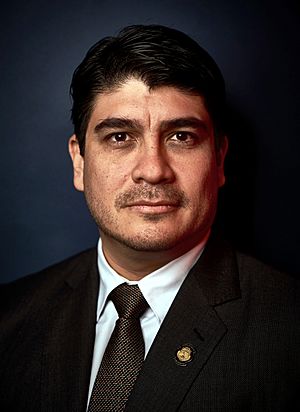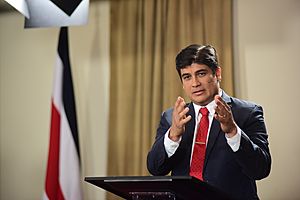Carlos Alvarado Quesada facts for kids
Quick facts for kids
Carlos Alvarado Quesada
|
|
|---|---|

Carlos Alvarado Quesada, former President of Costa Rica
|
|
| 48th President of Costa Rica | |
| In office 8 May 2018 – 8 May 2022 |
|
| Vice President | Epsy Campbell Barr Marvin Rodríguez Cordero |
| Preceded by | Luis Guillermo Solís |
| Succeeded by | Rodrigo Chaves Robles |
| Minister of Labor and Social Security | |
| In office 28 March 2016 – 19 January 2017 |
|
| President | Luis Guillermo Solís |
| Preceded by | Víctor Morales Mora |
| Succeeded by | Alfredo Hasbum Camacho |
| Minister of Human Development and Social Inclusion | |
| In office 10 July 2014 – 29 March 2016 |
|
| President | Luis Guillermo Solís |
| Preceded by | Fernando Marín Rojas |
| Succeeded by | Emilio Arias Rodríguez |
| Personal details | |
| Born |
Carlos Andrés Alvarado Quesada
14 January 1980 San José, Costa Rica |
| Political party | Citizens' Action Party |
| Spouse |
Claudia Dobles Camargo
(m. 2010) |
| Children | Gabriel |
| Education | University of Costa Rica (BA, MA) University of Sussex (MA) |
Carlos Andrés Alvarado Quesada (born 14 January 1980) is a Costa Rican politician, writer, and journalist. He served as the 48th president of Costa Rica from 8 May 2018 to 8 May 2022. He is a member of the Citizens' Action Party (PAC). Before becoming president, he was the Minister of Labor and Social Security under President Luis Guillermo Solís.
Alvarado was 38 years old when he became president. This made him the youngest Costa Rican president since Alfredo González Flores, who took office in 1914 at age 36.
Contents
Education and Learning
Carlos Alvarado studied at the University of Costa Rica, where he earned a bachelor's degree and a master's degree in political science. He also received a special scholarship called the Chevening Scholarship from 2008 to 2009. This scholarship allowed him to study in England, where he earned another master's degree in development studies from the University of Sussex.
Personal Life and Family
Carlos Alvarado was born in San José, Costa Rica, on 14 January 1980. His father, Alejandro Alvarado Induni, was an engineer, and his mother, Adelia Quesada Alvarado, was a homemaker. He has an older brother, Federico, and a younger sister, Irene.
He met his wife, Claudia Dobles Camargo, when they were children. They rode the same school bus to elementary school. Carlos Alvarado is Roman Catholic.
Career Highlights
Writing and Books
Carlos Alvarado is also a writer. In 2006, he published a collection of stories called Transcriptions Infields. In the same year, he won an award for his novel La Historia de Cornelius Brown. In 2012, he published a historical novel called Las Possessions. This book tells about a difficult time in Costa Rican history during World War II.
Early Political Roles
Before becoming president, Carlos Alvarado worked in several important roles. He was an advisor for the Citizen Action Party in the Legislative Assembly of Costa Rica from 2006 to 2010. He also worked as a consultant for the Institute of Development Studies in the United Kingdom.
He taught at the University of Costa Rica and the Universidad Latina de Costa Rica. During the government of President Luis Guillermo Solís, Alvarado served as the Minister of Human Development and Social Inclusion. He also led the Joint Social Welfare Institute, which helps people with fewer resources. Later, he became the Minister of Labour.
President of Costa Rica (2018–2022)
Carlos Alvarado Quesada won the 2018 Costa Rican general election on 1 April 2018, with 61% of the votes. He became president on 8 May 2018.
As president, Carlos Alvarado Quesada focused on making Costa Rica's economy more environmentally friendly. He set a goal for the country to have zero net carbon emissions by 2050. He also planned to build an electric train system for the capital city, San José. This was important because transportation creates a lot of greenhouse gas emissions in the country. On 24 February 2019, he launched a plan to fully "decarbonize" Costa Rica's economy. He said this was "the great challenge of our generation."
During his time as president, Costa Rica faced economic challenges. The government worked to manage public spending.
After the Presidency
After his presidency ended on 8 May 2022, Carlos Alvarado continued to be involved in important discussions. He was invited to speak about topics like sustainability, energy, and climate change by various organizations.
Currently, he is a professor at the Graduate School of Global Affairs at Tufts University in Massachusetts, United States.
See also
 In Spanish: Carlos Alvarado Quesada para niños
In Spanish: Carlos Alvarado Quesada para niños
 | Mary Eliza Mahoney |
 | Susie King Taylor |
 | Ida Gray |
 | Eliza Ann Grier |


